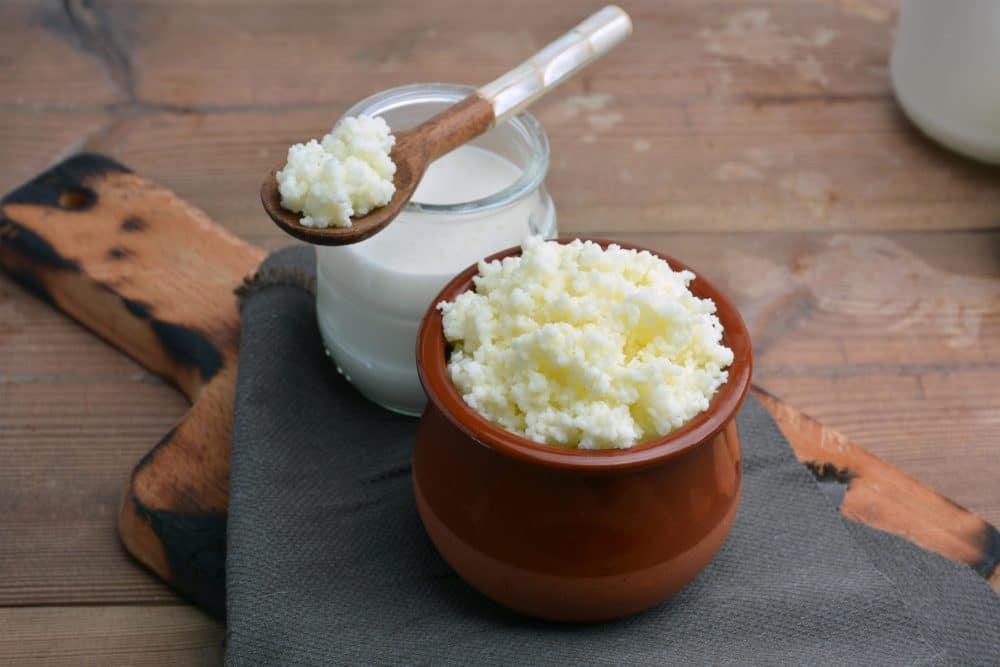The health benefits of kefir

Kefir is a drink made from the fermented milk of a cow, goat, or sheep. It contains around 30 unique species of probiotics (good bacteria) that improve gut health and aid the body’s digestive processes.
What is kefir?
Kefir is similar to Greek yogurt, but thinner in consistency, making it more of a drink. It has a tart and sour taste, as well as a slight fizz due to carbon dioxide – the end product of the double fermentation process. Its uniqueness lies in the use of grain-like colonies of yeast and lactic acid bacteria.
This food product originated centuries ago in the Caucasus Mountains. The word “kefir” is derived from the Turkish word “keif,” which translates approximately to “good feeling”. This is perhaps not surprising as it contains around 30 unique species of probiotics (good bacteria) that improve gut health and aid the body’s digestive processes.
In addition, kefir is very nutritional, and rich in:
- Calcium
- Phosphorous
- Magnesium
- Protein
- Vitamins C, D, K2, B12, B7, B2, and B9
What are the health benefits of kefir?
- Immune system. Folate (vitamin B9) and biotin (vitamin B7) help strengthen our body’s cells, and kefir’s high probiotic content fortifies the body’s defences (lactobacillus in particular helps protect against salmonella bacteria and E. Coli).
- Bone health. Like other dairy products, kefir is highly recommended for preventing osteoporosis. Not only is it rich in calcium, but its bioactive components help calcium be absorbed efficiently by the body, thus slowing down bone deterioration.
- Cancer. Studies have shown that the probiotic compounds in kefir are able to slow down the early growth of certain tumours, and even eliminate cancerous cells in the stomach.
- Allergies. Kefir helps to combat asthma and certain allergies that are closely related to inflammatory issues. Lab tests have demonstrated a reduction of mucus in mice due to the probiotics’ capacity to reduce inflammatory cells in the respiratory tract.
- Digestion. The science is clear: consuming probiotic foods such as kefir is very effective in restoring natural intestinal flora in the digestive system. This helps combat health problems such as Crohn’s disease, stomach ulcers and irritable bowel, in addition to diarrhoea and other gastrointestinal disorders.
- Lactose intolerance. Many people are unable to consume dairy products because of their body’s inability to digest lactose. This is not the case with kefir. Not only can kefir be up to 99% lactose free, but its good bacteria help digest the lactose.
- Skin health. Poor gastrointestinal health often produces skin problems such as acne, rashes, psoriasis or eczema. Kefiran (an interesting extracellular polysaccharide with many hydroxyl groups) aids healing and protects supportive and connective tissue.
Other healthy probiotic foods
- Yoghurt. Similar to kefir, yoghurt is an important probiotic food that helps us stay healthy. Its live micro-organisms remain active long enough to build up the gut microbiota. It reduces the risk of gaining weight and developing type 2 diabetes.
- Pickles. Pickled food products such as sauerkraut, gherkins, spring onions, olives and capers are a huge source of probiotics. Their fermentation makes them great antioxidants.
- Miso. This traditional Japanese seasoning is made from fermenting soybeans with the fungus koji (aspergillus oryzae). This process breaks down the soy proteins into amino acids that are very easy for the body to absorb. Miso provides probiotic health benefits as well as lowering cholesterol and reducing the odds of heart disease by 30%.
No comment yet, add your voice below!




